| Srl | Item |
| 1 |
ID:
119892


|
|
|
|
|
| Publication |
2012.
|
| Summary/Abstract |
As the dominant site and sign of human settlement, the city exemplifies and displays the fundamental concerns of the human condition in the twenty-first century. Just as urban living concentrates us in close proximity, the city clusters clichés and sermons, critiques and self-serving assurances. The world's most livable cities are well-planned and prosperous. Slums are disgusting. Congestion causes road rage. Electric vehicles are the answer. Planning is good.
|
|
|
|
|
|
|
|
|
|
|
|
|
|
|
|
| 2 |
ID:
109622


|
|
|
|
|
| Publication |
2011.
|
| Summary/Abstract |
For the globalized world economy with intensive international trade, an overview of energy consumption is presented by an embodied energy analysis to track both direct and indirect energy uses based on a systems input-output simulation. In 2004, the total amounts of energy embodied in household consumption, government consumption, and investment are 7749, 874, and 2009 Mtoe (million tons of oil equivalent), respectively. The United States is shown as the world's biggest embodied energy importer (683 Mtoe) and embodied energy surplus receiver (290 Mtoe), in contrast to China as the biggest exporter (662 Mtoe) and deficit receiver (274 Mtoe). Energy embodied in consumption per capita varies from 0.05 (Uganda) to 19.54 toe (Rest of North America). Based on a forecast for 2005-2035, China is to replace the United States as the world's leading embodied energy consumer in 2027, when its per capita energy consumption will be one quarter of that of the United States.
|
|
|
|
|
|
|
|
|
|
|
|
|
|
|
|